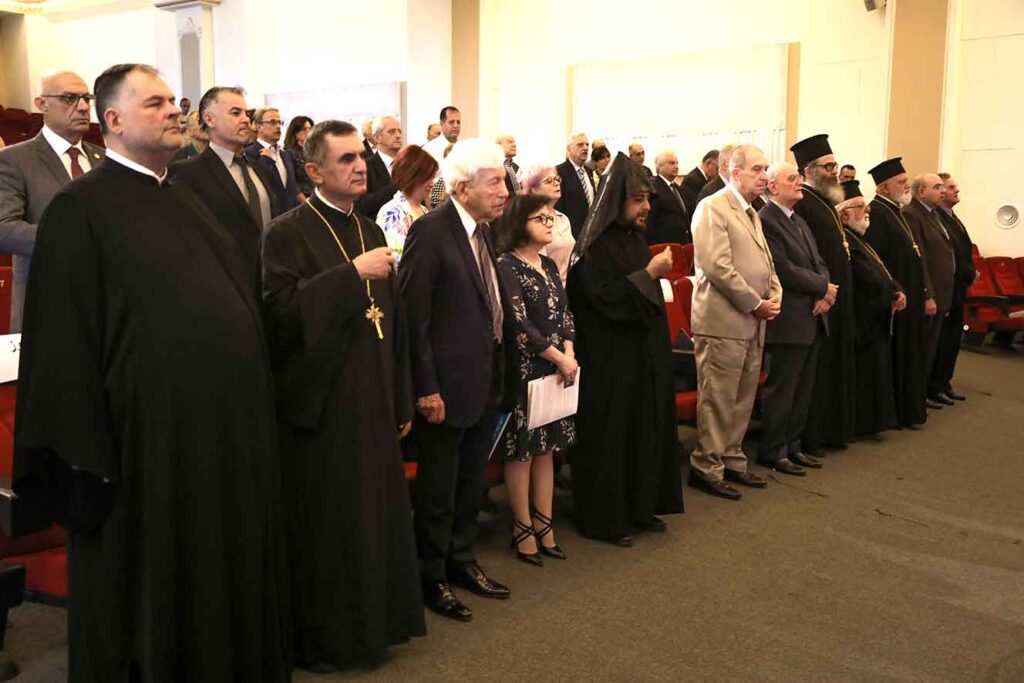On the occasion of the sad memory of the conquest of Constantinople and its martyrdom on May 29, 1453, as is customary every year, and to commemorate the 1700th anniversary of the First Ecumenical Council of Nicaea, the Romaïan Cultural Society held its fifth scientific conference titled “Strengthening Christian Faith Unity: The 1700th Jubilee of the First Ecumenical Council of Nicaea,” under the presidency of the Secretary-General of the Middle East Council of Churches, Professor Michel Abs, and attended by a large number of the association’s members and friends, and those concerned with the conference topic. This event took place on Saturday, May 31, 2025, at the Liqaa Center, near the Patriarchate of the Romaïan Catholics, Rabweh – Lebanon.
The conference included four sessions attended by bishops and priests, specialists from various fields, official, cultural, intellectual, and social figures, as well as members of the administrative board of the Romaïan Cultural Society and members of its Cultural Activities Organizing Committee, chaired by Engineer Abdallah Hayek, and the working team of the Middle East Council of Churches.
The conference, which was broadcast live on Télé Lumière and Noursat, began with the Lebanese national anthem and the Constantinopolitan anthem, followed by an opening speech by the master of ceremony, Mrs. Lea Adel Maamari, head of the Media Committee of the Romaïan Cultural Society, and media officer and coordinator of ecclesiastical and media relations at the Middle East Council of Churches. She pointed out that “it has been seventeen centuries since the Council of Nicaea, this monumental event that once attracted the elite Christian leaders around the world to discuss a serious matter, where doubt was resolved with certainty, and the paths to heresies and distortions of the true faith were annihilated.”
Afterward, the president of the Romaïan Cultural Society, Professor Negib Geahchan gave a speech, in which he said: “You who recited, in your baptism, the creed agreed upon by the fathers of the first ecumenical council in Nicaea, do not strip off the mantle of Christ. Do not deny the mission that your fathers and ancestors entrusted to you two thousand years ago. Do not abandon the lineage that was first bestowed upon you in the city of God, Great Antioch. Do not be dismayed or weakened by the many wolves of your surrounding world. Do not flee from confronting the enemies of your righteous faith. Do not falter before the demons of this world…. Carry the banner of the cross as Constantine the Great did, and be assured that with it alone you will triumph.”
Then, the Secretary General of the Middle East Council of Churches and the conference president, Professor Michel Abs, delivered a speech in which he said: “The ecumenical movement, and I remind you that its foundational name is joint Christian work, has proven to be a means of spiritual closeness among believers through engaging in joint service activities, which bring hearts together and break down the rigid walls that were built among the members of the one eternal Church… We must forge a new text, agreed upon by all components of the one Church of Christ, which includes a commitment to ecumenical cooperation as a new form of spreading of the Christian message…”.
The sessions began afterwards, and specialists and experts lectured on four topics through documented presentations on a giant screen that conveyed the details of the conference to the attendees, both in sound and image. These four sessions revolved around “the historical context preceding the council,” “the ecclesiastical issues preceding the council,” “the convening of the first ecumenical council, its agenda, and its resolutions,” and “the conference’s results in their short and long run.” The fourteen lectures were delivered by a number of professors of history and theology, clergy, experts, and persons interested in Romaïan culture, most of whom were from Lebanon, with some from Greece and America. The list included doctors Marc Abou-Abdallah, Imad Mrad, Négib Geahchan, Simon Abdelmassih, Christos Arampatzis and Marlène Haidar. Attorney Chafic Majdalani, Mr Roland Khairallah, engineer Nicolas Saba, architect Gabriel Andrea, H.E. Metroplitan Kyrillos (Bustros), and fathers Porphyrios (Georgi), Hareth (Ibrahim) and Fadi (Rabbath).
During the conference, the deceased celebrity Dr. Assad Rustum was honored and registered in the Golden Book of the Deceased Romaïan Endowed Persons at the Romaïan Cultural Society. The family of the honoree, represented by his son Dr. Salah Rustum, received the registration certificate. Dr. Assad Rustum is known for his famous historical works that shed light on the history of the Antiochian Church and the history of the Romaïan civilization. In the honoring session, speeches were delivered by Dr. Elie Moucadié, head of the Honoring Committee at the Romaïan Cultural Society, Engineer Gabriel Andrea, the Secretary of the Committee, and Dr. Salah Rustum, highlighting the honoree’s journey, significant milestones in his life, and his achievements.
At the end of the conference, Secretary-General Professor Michel Abs delivered a brief speech in which he presented the conclusions of the conference and its future aspirations regarding the need for churches to cooperate, integrate, and agree on a new common covenant. The conference included documented reports produced by the media of the Middle East Council of Churches and the Romaïan Cultural Society about the Council of Nicaea, the goals and aspirations of the Romaïan Association, and the significant achievements of the historian Assad Rustum.

 Romaian Cultural Society News
Romaian Cultural Society News

